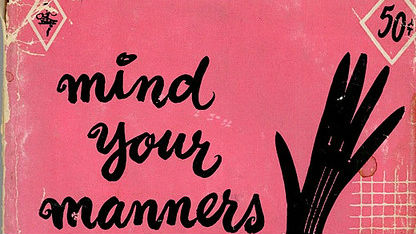The Manner-Challenged, and their Children

Our power was out all weekend, along with that of millions of other electricity refugees. Our city’s patience and civility were fraying.
Cannibalism loomed just around the corner, so my husband, son and I headed out to an air-conditioned restaurant for dinner.
This restaurant isn’t a fancy, fussy place. Nor is it Chuck E Cheese. The restaurant was filled with child-free groups, and some parents with children.
We were feeling mellow and relaxed after drinks at the bar, and took our seats.
A few minutes into the meal, a four-year old girl or so sitting in the booth behind ours, a “neuro-typical,” communicative child, decided that our conversation was more interesting than whatever was going on at her table. She stood up on her seat, rested her elbows on our side of the booth, and stared at us, with baleful curiosity.
My son was amused. I was too, at first, because I was sure that the parents would soon educate their daughter that staring at people, standing on your seat while at the dinner table, and intruding uninvited on someone’s space and privacy was rude.
We continued with our conversation about how much we missed electricity.
The girl didn’t budge. She slid over, to better absorb our conversation.
The parents did nothing.
I said, “excuse me,” politely, to the girl.
Still, she didn’t move. A few minutes later, the girl spat lightly but intentionally on my arm. And her act wasn’t in response to anything that I’d written lately, either.
I turned to her and said calmly and matter-of-factly, “You spat on my arm.” The girl said nothing.
I turned to the dad and said, “she spat on my arm.” No apology from the dad, and no action taken to help the girl understand manners, except for him to chirp sunnily to me, “oh, that’s not good.”
No, indeed, it’s not!
Meanwhile, one table behind the Spitting Eavesdropper sat a two-year old girl in a high chair.
Her mom wore doctor’s scrubs. Presumably, she was a medical professional. The dad was sucking back beers, which I can understand, because if I had a daughter who could yell as loudly and persistently as this one, then I’d be drinking steadily, too. It’s one of those children’s books that you’ll never see: Your Father Drinks Because You Cry.
The mellowness of the dining experience was evaporating entirely. As my son says, its “moment of greatness” had passed. My husband’s shoulders were rising in tension.
“There’s no pleasing that girl,” the waitress said, as she served our appetizers.
This toddler—again, by all indications neuro-typical, and physically normal—was so inconsolable that she let loose an eardrum-popping, blood-curdling scream about once every one to two minutes. Then, she’d cry. By the end of the dinner, our ears were, literally, ringing.
Restaurant patrons were turning around discreetly to see what was going on. A few exchanged conspiratorial, sympathetic looks, that we were stuck in a city with no power, in a restaurant with Bride of Chucky.
And during the hour that this child screamed, cried and yelled, her parents did… nothing.
The mom worked her IPhone and texted. Occasionally, she’d turn to her daughter, exasperated, and try to reason with her. “Shhh, you should be quiet.”
The dad kept jumping in the baby’s face and making frightening, shocking noises at her. Maybe he was imagining that her distress was caused by boredom.
None of these techniques—High-Level Verbal Reasoning with a Toddler, Burying Your Face in Your IPhone, or Shocking Your Child Out of Her Tantrum—worked.
In a dereliction of manners, the parents didn’t consider the 60 other people in the restaurant. For example, neither of them walked with the baby outdoors, so that everyone could enjoy a brief reprieve. It would have been a nice gesture for them to do that for each other, too.
I’ve never known my son to refuse dessert, but he did this night, sacrificing the sure promise of chocolate cake to be able to leave faster.
Look, we all know how it is. We’ve been there with our own toddlers. And most all of us sympathize, and will offer a helpful hand, if there are gracious ways to do it.
But I can’t understand parents who won’t teach their children manners, or use good manners themselves.
It seems to me that there’s an interesting class component to manners dereliction. Extreme manner-free behavior, when I encounter it, is more common among parents who “code” as the professional or creative classes. This makes me suspect that there might be some new, popular, over-thought parenting theory behind it.
Plausibly, the offending theory boils down in practice if not in letter to what I call prescriptive narcissism, along the lines of: “Your Child is the Center of the Universe, and You Must do Absolutely Everything Just for Your Child and Her Individual Success and Pleasure, Never Mind Everyone Else.”
I was on a flight with a young mother who was taking her first flight, with her infant. She didn’t look at all affluent, or “sophisticated” in her parenting techniques. Gasp, she was even bottle-feeding her baby. It might not even have been breast milk!
But she had manners. When her baby couldn’t settle down, she apologized for the ruckus, which only encouraged those around her to help.
She understood instinctively the simple essence of manners, which applies to all of us: She realized that other people existed, and had feelings that should be respected, and that this was the mortar holding society together. She didn’t act as if she and her child owned the world.





